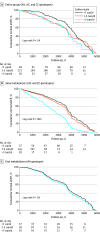CYP1A2 Genetic Variation, Coffee Intake, and Kidney Dysfunction
- PMID: 36701157
- PMCID: PMC9880799
- DOI: 10.1001/jamanetworkopen.2022.47868
CYP1A2 Genetic Variation, Coffee Intake, and Kidney Dysfunction
Abstract
Importance: Caffeine is detoxified by cytochrome P450 1A2 (CYP1A2), and genetic variation in CYP1A2 impacts the rate of caffeine clearance. Factors that may modify the association between coffee intake and kidney disease remain unclear.
Objective: To assess whether CYP1A2 genotype modifies the association between coffee intake and kidney dysfunction.
Design, setting, and participants: The Hypertension and Ambulatory Recording Venetia Study (HARVEST) was a prospective cohort study of individuals with stage 1 hypertension in Italy; HARVEST began on April 1, 1990, and follow-up is ongoing. The current study used data from April 1, 1990, to June 30, 2006, with follow-up of approximately 10 years. Blood pressure and biochemical data were collected monthly during the first 3 months, then every 6 months thereafter. Data were analyzed from January 2019 to March 2019. Participants were screened and recruited from general practice clinics. The present study included 1180 untreated participants aged 18 to 45 years with stage 1 hypertension; those with nephropathy, diabetes, urinary tract infection, and cardiovascular disease were excluded.
Exposures: Coffee intake and CYP1A2 genotype rs762551 were exposures analyzed over a median follow-up of 7.5 (IQR, 3.1-10.9) years.
Main outcomes and measures: Albuminuria (defined as an albumin level of ≥30 mg/24 h) and hyperfiltration (defined as an estimated glomerular filtration rate of ≥150 mL/min/1.73 m2) were the primary outcomes as indicators of kidney dysfunction.
Results: Among 1180 participants, genotyping, lifestyle questionnaires, and urine analysis data were obtained from 604 individuals (438 [72.5%] male) with a mean (SD) age of 33.3 (8.5) years and a mean (SD) body mass index (calculated as weight in kilograms divided by height in meters squared) of 25.4 (3.4). A total of 158 participants (26.2%) consumed less than 1 cup of coffee per day, 379 (62.7%) consumed 1 to 3 cups per day, and 67 (11.1%) consumed more than 3 cups per day. Genotype frequencies for rs762551 (260 participants [43.1%] with genotype AA, 247 participants [40.8%] with genotype AC, and 97 participants [16.1%] with genotype CC) did not differ between coffee intake categories. The level of risk of developing albuminuria, hyperfiltration, and hypertension, assessed by Cox regression and survival analyses, was not associated with coffee intake in the entire group or among fast metabolizers. The risks of albuminuria (adjusted hazard ratio [aHR], 2.74; 95% CI, 1.63-4.62; P < .001), hyperfiltration (aHR, 2.11; 95% CI, 1.17-3.80; P = .01), and hypertension (aHR, 2.81; 95% CI, 1.51-5.23; P = .001) increased significantly among slow metabolizers who consumed more than 3 cups per day.
Conclusions and relevance: In this study, the risks of albuminuria, hyperfiltration, and hypertension increased with heavy coffee intake only among those with the AC and CC genotypes of CYP1A2 at rs762551 associated with slow caffeine metabolism, suggesting that caffeine may play a role in the development of kidney disease in susceptible individuals.
Conflict of interest statement
Figures



Similar articles
-
CYP1A2 polymorphisms modify the association of habitual coffee consumption with appetite, macronutrient intake, and body mass index: results from an observational cohort and a cross-over randomized study.Int J Obes (Lond). 2022 Jan;46(1):162-168. doi: 10.1038/s41366-021-00972-6. Epub 2021 Sep 25. Int J Obes (Lond). 2022. PMID: 34564706 Clinical Trial.
-
CYP1A2 genotype modifies the association between coffee intake and the risk of hypertension.J Hypertens. 2009 Aug;27(8):1594-601. doi: 10.1097/HJH.0b013e32832ba850. J Hypertens. 2009. PMID: 19451835
-
Long-term coffee consumption, caffeine metabolism genetics, and risk of cardiovascular disease: a prospective analysis of up to 347,077 individuals and 8368 cases.Am J Clin Nutr. 2019 Mar 1;109(3):509-516. doi: 10.1093/ajcn/nqy297. Am J Clin Nutr. 2019. PMID: 30838377
-
Caffeine, CYP1A2 Genotype, and Exercise Performance: A Systematic Review and Meta-analysis.Med Sci Sports Exerc. 2024 Feb 1;56(2):328-339. doi: 10.1249/MSS.0000000000003313. Epub 2023 Oct 11. Med Sci Sports Exerc. 2024. PMID: 37844569
-
Caffeine and blood pressure: a critical review perspective.Nutr Res Rev. 2019 Dec;32(2):169-175. doi: 10.1017/S0954422419000015. Epub 2019 Apr 5. Nutr Res Rev. 2019. PMID: 30947761 Review.
Cited by
-
Coffee intake and risk of diabetic nephropathy: a Mendelian randomization study.Front Endocrinol (Lausanne). 2023 Jul 4;14:1169933. doi: 10.3389/fendo.2023.1169933. eCollection 2023. Front Endocrinol (Lausanne). 2023. PMID: 37469984 Free PMC article.
-
Interaction Between CYP1A2-Related Caffeine Metabolism and Vitamin B12/Folate Status in Patients with Metabolic Syndrome: A Novel Biomarker Axis.Metabolites. 2025 Jul 4;15(7):450. doi: 10.3390/metabo15070450. Metabolites. 2025. PMID: 40710550 Free PMC article.
-
Association between daily coffee intake and diabetic kidney disease: evidence from the 2007 to 2016 NHANES.Int Urol Nephrol. 2025 Sep;57(9):2967-2977. doi: 10.1007/s11255-025-04480-8. Epub 2025 Apr 2. Int Urol Nephrol. 2025. PMID: 40172611
-
Integrated Analysis of Genomic and Genome-Wide Association Studies Identified Candidate Genes for Nutrigenetic Studies in Flavonoids and Vascular Health: Path to Precision Nutrition for (Poly)phenols.Nutrients. 2024 Apr 30;16(9):1362. doi: 10.3390/nu16091362. Nutrients. 2024. PMID: 38732608 Free PMC article.
-
Caffeine intake and cardiometabolic risk factors in adolescents in the United States.Pediatr Res. 2025 Apr;97(5):1650-1658. doi: 10.1038/s41390-024-03511-x. Epub 2024 Aug 26. Pediatr Res. 2025. PMID: 39187631
References
-
- Tanner GA, Tanner JA. Chronic caffeine consumption exacerbates hypertension in rats with polycystic kidney disease. Am J Kidney Dis. 2001;38(5):1089-1095. doi:10.1053/ajkd.2001.28614 - PubMed
MeSH terms
Substances
LinkOut - more resources
Full Text Sources
Medical
Molecular Biology Databases
Miscellaneous

